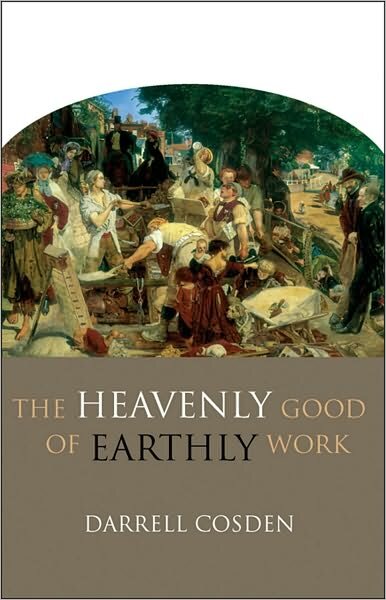Darrell Cosden, The Heavenly Good of Earthly Work. Baker Academic, 2006.
Prequel: Cosden, A Theology of Work
Referenced in: Missional Lifestyle, Discipleship, Spirituality – Missional Spirituality of Work
LifeandLeadership.com Summary
This is a rich spiritual theology of work, showing how the kingdom of God is manifested in the honorable work that makes up such a major part of our lives now and in eternity. Throughout, it demonstrates a strong tie to a “missional” understanding of life. It is a more popular level edition of Cosden’s earlier volume, A Theology of Work. Cosden also interacts with other leading theologians and missiologists such as Miroslav Volf, Work in the Spirit, and David Bosch, Transforming Mission.
Cosden’s major themes are also found in the works of another author, R. Paul Stevens, especially his volume, The Other Six Days. Both Stevens and Cosden are practical theologians. Cosden’s volume is more academic, an abridged version of his scholarly monograph on the same subject. Stevens’ work, though theologically sound, is slightly less academic, and addresses the leadership dimensions of equipping the church toward a missional lifestyle.
One of Cosden’s chief tenets is a rejection of the “hierarchy of callings,” i.e. careers such as the helping professions are the spiritual vocations that rank at the top while the more “earthly” and “selfish” vocations like lawyer, politician and businessperson are at the bottom. They trace both the Catholic and Protestant roots of this perception to a kind of “dualism” (spirit is good, matter is evil).
In contrast, Cosden builds a theology that connects work to God’s purpose for creation, and the redemptive value of work to its eventual role in the new creation. Work, like all good things in creation, has been affected by the fall, and recovers the meaning God intended when it is “saved.” Furthermore, our final redemption in “heaven” will more accurately be in the “new heavens and the new earth” where instead of being delivered from work, our work will be delivered from the ravages of evil and infused with new meaning. Like all of the rest of the “very good” creation (Gen. 1:31), work will be glorified and delivered from its “bondage to corruption” (Rom. 8:21). The redeemed will live in the “city of God” (Rev. 21:2, 24-26), which interestingly is not a return to a pristine image of an Edenic garden, but instead a city that displays the “glory and honor of the nations.” “Here a city, at best an ambivalent product of human work (Gen. 4:17), represents the future of God’s and our new created reality.” (75)
It is a place where each person is fully healed and experiences well-being, a harmonious relationship within him or herself. Each person’s human potential is fully realized. It is a place where we become…what we were always intended to be. (77)
On this side of eternity, God still wants us to engage our work as his apprentices “who shape and reshape the world through our work.” (98) But since we live “under the conditions of the curse, our work and what it produces are ambivalent at best.” (100) Our work here, no matter how good, still bears the marks of decay. Our “earth keeping,” advanced technologies as an example, are tainted with the knowledge of good and evil. Yet, because we are redeemed now, we can work so as to approximate at some level the anticipated “future glorification of ourselves, or nature, and of work.” (100)
The last two chapters of the book build upon this theological base to argue that “ordinary working believers can live ‘first class’ Christian lives, full of both meaning and purpose…[and be] spiritually liberated rather than frustrated in our work. (103)
Those looking for practical direction on how to make their “earthly work” more reflective of God’s calling and mission may be disappointed in this text. It is more theological than practical, but it presents that theology in very understandable terms.
From the Publisher
Does a person’s day to day work have any ultimate value from the perspective of Eternity? Should our work be seen as a discipline through which we connect spiritually with God and others? Is ordinary work the primary way that people can participate in God’s mission to make all things new? What is the heavenly good of earthly work?
In this book Darrell Cosden takes us on a spiritual and theological journey of discovery exploring these questions. Creatively, constructively, and sometimes provocatively, he shows us that the heavenly good of earthly work really makes the gospel good news for ordinary people by offering the possibility of a genuinely purpose-full Christian life.
About the Author
Darrell T. Cosden is lecturer in theology and ethics at International Christian College, Glasgow. He is the author of A Theology of Work.
***For additional information on this resource, including reviews, click the bookstore links. Check the reference at page top or the links below for resource guides on related topics.***
See Resources on Over 100 Areas of Ministry Leadership


